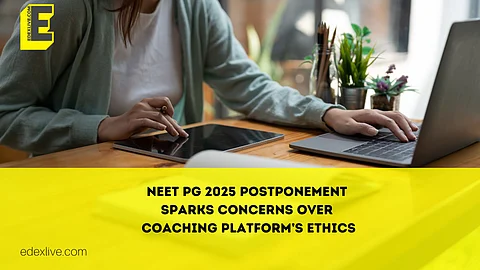

The Supreme Court’s decision to hear the National Board of Examinations’ (NBE) application for conducting NEET PG 2025 on August 3 has left thousands of medical aspirants in limbo.
Originally scheduled for June 15, the exam was postponed after concerns were raised over its proposed two-shift format, creating ripple effects across the medical education ecosystem.
What followed transcended mere academic disruption, evolving into a profound institutional crisis that has laid bare the vulnerabilities inherent in India’s increasingly commercialised medical education ecosystem.
As the dust settles on this disruption, a new controversy has emerged around how medical coaching platforms are responding to the crisis.
The institutions are reportedly charging fees to extend course access, sparking concerns about corporate responsibility during times of institutional uncertainty.
To understand the contours of this unfolding story, Edexlive spoke to key voices: a senior source at one of India’s leading coaching platforms, who requested anonymity, and Dr Deepak Aanjna, Medical Officer at UPHC Ratlam and a vocal advocate for medical aspirants.
Dr Aanjna took to social media with a pointed message directed at major NEET PG platforms, including Marrow, PrepLadder, and Cerebellum. “Students bought your plans based on the original NEET PG exam date. Now that the exam has been postponed, it is your responsibility to give free access until the new exam date without charging extra,” he wrote in a post on X.
Speaking with Edexlive, he argued that the operational burden of such an extension is minimal. “Most of these services consist of recorded lectures, pre-uploaded question banks, and self-paced materials. Students aren’t requesting new live sessions or additional content, just uninterrupted access to what they’ve already paid for,” he explained.
The human cost, he argues, far outweighs any business considerations. “This situation imposes emotional and financial strain not only on the students but also on their families. Asking for additional money under these circumstances is both emotionally and financially draining,” he said.
A senior source at one of the major coaching platforms offered a different perspective on the dilemma. “While students are understandably stressed and disheartened by the sudden change, we too have had to recalibrate our academic calendar,” the source explained.
Acknowledging the difficulties faced by learners, he added, “Nonetheless, our approach remains student first. We will adapt to the evolving situation and make decisions that are both compassionate and practical, always prioritising what best supports our learners.”
The platform's response, according to the executive, represents a carefully calibrated attempt to balance student support with sustainability.
In line with that sentiment, one of the leading platforms, Marrow, has sought a middle ground. In a post on X, it announced that all June expiring plans would be extended until June 30, and that short-term plans are available at a discounted price for students whose subscriptions expire by August 15.
While this is seen as a compromise between operational needs and student support, critics contend that it nonetheless imposes an unjust financial burden on aspirants thrust into a circumstance beyond their control.
This controversy once again exposes the fundamental tension within India’s privatised education support system. While coaching platforms play a crucial role in competitive exam preparation, their commercial nature often leads to conflicts during institutional crises.
As stories of coaching centre failings and controversies have long echoed through India’s education corridors, this episode stands as yet another reminder of the deep structural cracks in a profit-driven ecosystem.
The question of where business interests end and social and ethical responsibility begins remains as relevant as ever.
Dr Aanjna's call to action resonates with the frustration of thousands who feel caught between institutional unpredictability and commercial opportunism.
“Students committed their trust and financial resources based on the official NEET PG timetable. With the unforeseen postponement beyond their control, it is imperative, these coaching platforms honor that trust by providing access without imposing additional burdens.”
All eyes across the medical community are now on the Supreme Court’s forthcoming hearing, a pivotal moment that may finally bring clarity in this uncertainty.
The outcome is eagerly awaited by thousands of aspirants seeking resolution and a path forward amid the ongoing disruption.
